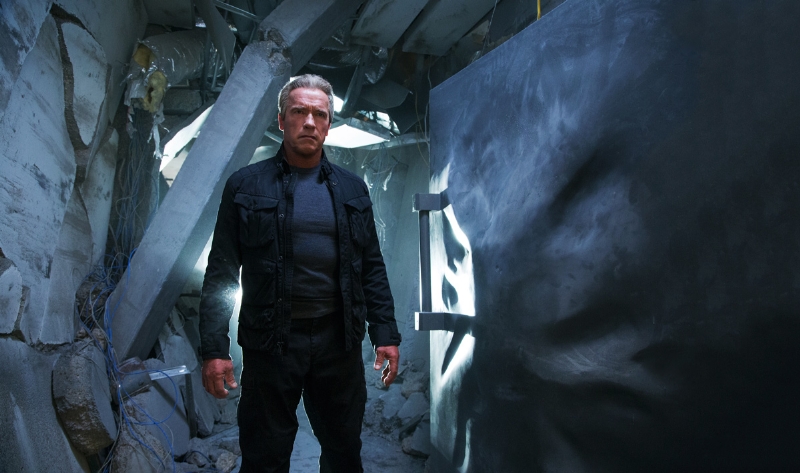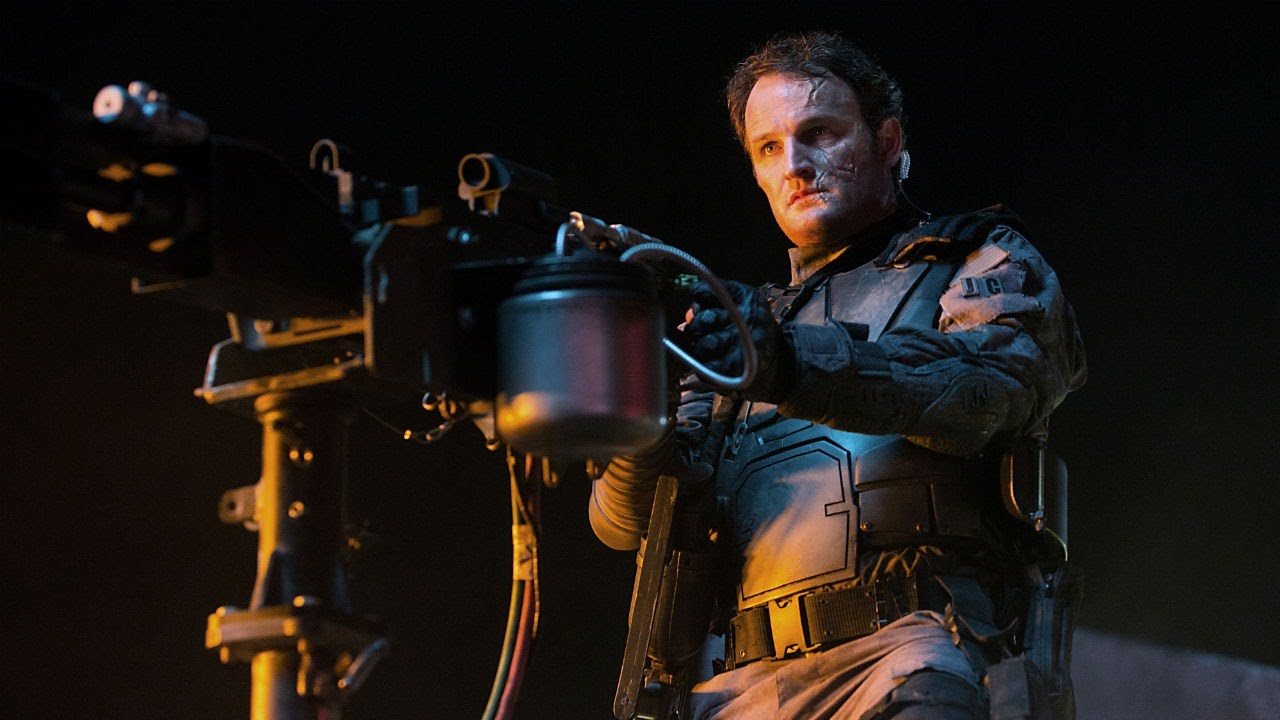REVIEW: 'Terminator Genisys'
There’s one part of Terminator Genisys that rattles around in my brain. This in itself was a surprise, given how the movie seems to actively try to confuse the audience in a mad attempt to outrun its own mess. But the part that sticks with me is when one character is having a showdown with the heroes, and yells something like, “There’s no such thing as fate! Time can be rewritten!” And wham – with those lines, the dark secret of the Terminator franchise is revealed.
The movie essentially tells us exactly what’s wrong with it. It’s the product of a studio that will take any shortcut it can to deliver a new Terminator movie, even if means piggybacking off the best films in the series, then stomping on them. In effect, when Terminator Genisys isn’t busy being one of the more mediocre movies of the summer, it manages to be a grand statement about everything wrong with Hollywood remake culture.
Now, I’m not being naïve here. I fully understand that as a franchise, Terminator was ripe for a reboot. It plays well with the industry’s favourite demographics and has a bankable star in Arnold Schwarzenegger (even at age 67). Plus, the last two films (Terminator 3: Rise of the Machines and Terminator Salvation) were disliked enough by fans that the studio likely thought that some narrative slate-cleaning like that of X-Men: Days of Future Past was in order.
So, sure: recast the key characters, like Sarah Connor (Emilia Clarke), John Connor (Jason Clarke) and Kyle Reese (Jai Courtney), and find a new way to continue the story. Since the second film doesn’t really set itself up for a sequel that well, the filmmakers are forced to swerve a bit: they take us to a vision of the Terminator-infested future where Kyle Reese is sent back to the wrong version of the past, finding a Sarah Connor who doesn’t need his help, and a new threat that may outmatch even Sarah’s aging guardian (Schwarzenegger).
But that’s where the film begins to collapse under the weight of its own idea. The screenwriters evidently don’t want to waste any time developing their modified characters (or give us a reason to care about them), and decide to use the work of James Cameron as a convenient springboard. The implication is, “You already know the Connors and Kyle Reese, right? Cool. So let’s jump straight to the time travel and the explosions!”
Emilia Clarke’s Sarah repeatedly tells Reese, “forget about who I’m supposed to be.” Fine, but wouldn’t it be nice to get some insight into how this version of Sarah became who she is? And no, I don’t mean a quick flashback and some heavily expository dialogue. I’m talking about novel concepts like how she feels and what she thinks, not facts in a bulleted list. The Linda Hamilton version of Sarah was shaped over two films, and Genisys asks us to simultaneously remember the old Sarah and then pretend like she never existed. You know it’s a bad sign if you’re still figuring out which parts of the earlier stories really happened when the time travel stuff starts.
Let me tell you - by the time we start warping between the years 2027, 1984, and 2017 (roughly in that order), the last thing you need is Arnold Schwarzenegger, of all people, talking about alternate universes and quantum mechanics – and in his flat Terminator voice, no less! You could choose to see it as some bonus unintentional meta-comedy, but somehow that doesn’t really mesh with a horror-influenced series about killer cyborgs from the future.
Granted, any film that uses time travel as a key plot point throws a bit of logic out the door. You’re setting yourself up to be confused. That’s why it’s so baffling that the filmmakers of Terminator Genisys would double down on the paradoxes and introduce some dizzying revisionist storytelling into the mix. Why not have Schwarzenegger play guardian to a new set of characters? Maybe it’s because when a studio asks for a remake/reboot/re-whatever, it’s faster to mash together a bunch of old material and pass it off as new, hoping that the fans’ nostalgia will pick up the slack.
Of course, with any big summer blockbuster, you can make a case for the film as pure entertainment, and in certain spots, Genisys does live up to that expectation. In its rush to remix the earlier films, the movie fits in a few legitimately funny jokes (most courtesy of Schwarzenegger) and one or two decent fight scenes.
But Terminator 2 shows us how the franchise (under the right control) can exceed the most basic functions of an action film, and actually say something about trust and questioning your beliefs. We see the relationship between the young John Connor and the Terminator that protects him, and how together, they convince Sarah to dial back her fear and accept help from an unlikely source. Genisys references these ideas, but does so with the same “Hurry up, back to the ‘splosions!” attitude that it adopts with its characters.
In its most basic form, the Terminator films should be about that relentless force from Kyle Reese's warning in the original 1984 film: “It can't be bargained with. It can't be reasoned with. It doesn't feel pity, or remorse, or fear. And it absolutely will not stop, ever, until you are dead.” And while Terminator Genisys does try to emulate that feeling, it does so three times over, upside down and backwards for good measure. Which makes me wonder: maybe the Terminator movies aren’t as unstoppable as Hollywood would have you believe.
Terminator Genisys gets two stars out of four.
Have you seen the latest installment of the Terminator series? What did you think? Did it satisfy your need for some Schwarzenegger-fueled action? Or were you hoping that Genisys would live up to the legacy of the Cameron films? Join the discussion in the comments section, and if you liked this review, share it with your friends and followers!


